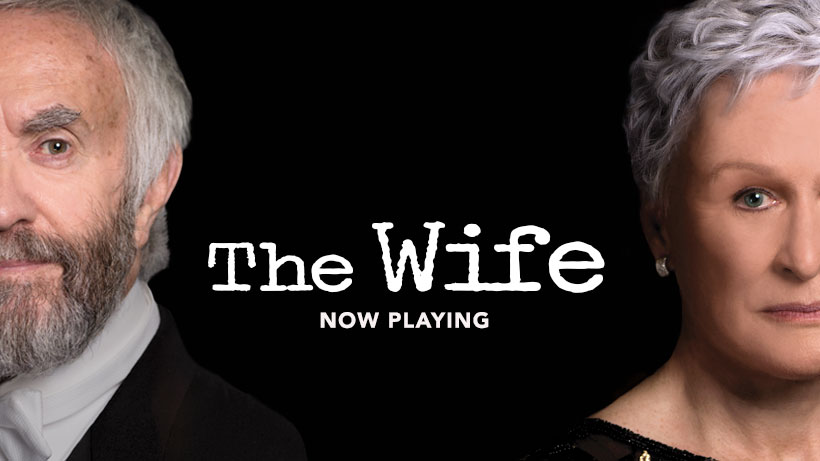Sidelined on Screen, Glenn Close Shines as ‘The Wife’
Movie poster from “The Wife.”
September 4, 2018
In the opening scene of Björn Runge’s new film “The Wife,” based on the novel of the same name by Meg Wolitzer, writer Joe Castleman (Jonathan Pryce) can’t sleep. Waiting apprehensively for an important call, he nervously snacks on candy, waking his wife, Joan (Glenn Close), who chides him for eating sugar so late at night.
Antsy and in need of distraction, he presses her for sex, and after some half-hearted and good-humored objection, she obliges.
Not long after, they’re woken by the phone. The man on the other end of the line has some news for Joan and Joe: Joe has been selected to receive this year’s Nobel Prize in Literature. He warns Joan that her husband will be bombarded by inquiries from the press, and that she should screen his calls. “I’ll take good care of him,” she responds.
Soon, they’re off to Stockholm for the awards ceremony. The bulk of the film takes place here, at the receptions and rehearsals, in an opulent hotel suite filled with gifts from Joe’s well-wishers.
Joe does well at home in this milieu of ecstatic praise and adoration; you get the sense that he’s so used to being the center of attention that he doesn’t even notice it anymore. Joan is always at his side, reminding him to bring his glasses and take his pills, chastising him for eating sweets and fatty foods like he’s an overgrown child.
But trouble brews. Joe’s stalker fan and eventual biographer, Nathaniel Bone (Christian Slater), has followed Joe and Joan to Stockholm, even somehow weaseling his way onto their flight. Later, Joan, without her husband’s knowledge, agrees to a drink with Nathaniel. Ostensibly there to assuage hurt feelings caused by her husband, Joan’s true motives are inscrutable.
The scene is gripping, as Nathaniel digs for information about Joe’s past and Joan subtly fends him off. Close’s performance, here and throughout the film, is virtuosic, projecting the steady grace of a woman who has willingly spent her entire adult life in a supporting role. Joan’s expansive intelligence goes unnoticed, outshone by her husband at every step, and the stillness of Close’s face in these scenes says everything.
The depth of Joe’s blindness to both his wife’s unceasing burden of caring for him and his effect on those around him is stunning, and at the same time totally believable. When his son, an aspiring writer who’s tagged along for the ceremony, storms off after Joe won’t give him feedback on a story at a press event, Joe is mystified. “He shouldn’t need my approval to write,” he tells Joan. “Everyone needs approval, Joe,” she responds.
Unfortunately, the film beyond Close’s performance — and those of Pryce and Slater, who also avail themselves well — is distinctly lacking in subtlety, and the other performers — Max Irons as the son, Annie Starke and Harry Lloyd as young Joan and Joe in flashback — are noticeably weak. The running commentary on the boy’s club that is writing, and the world at large, verges on cartoonish at times, and while the truth of the matter may not be far off at all, it’s still glaring.
When Joe does eventually sit down and give his son an honest appraisal on his story, he’s harsh, but fair: “It’s not bad,” he says, “it’s compelling, all the ideas are there.” If only the film had taken its own advice.
A version of this article appeared in the Tuesday, Sept. 4 print edition. Email Alex Cullina at [email protected].



























































































































































